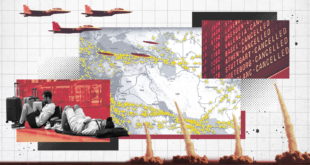Following is the November 2023 installment of “ISIS Redux: The Central Syria Insurgency,” a monthly chronicle of attacks by the terrorist group ISIS in central Syria. A review of developments throughout 2022 and 2021 can be found here and here. The January 2023 edition of ISIS Redux can be found here, February’s here, March’s here, April’s here, May’s here, June’s here, July’s here, August’s here, September’s here, and October’s here. A full background and analysis of ISIS’s resurgence in Syria, including the methodology used to collect this data, can also be explored here, here, and here.
ISIS carried out at least 17 confirmed attacks in November in the Homs, Hama, Raqqa, Aleppo, and Deir Ez Zor governorates. These attacks killed at least 67 pro-Assad regime soldiers and wounded at least 23 more. One civilian was killed as well. There were also nine high quality* attacks during November. High quality attacks usually represent about a quarter to a third of all attacks, so the high proportion (53 percent) in November suggests there were additional attacks not documented by this author this month (more on this later). While the overall number of ISIS attacks in central Syria decreased slightly compared to October, a qualitative assessment of the month’s fighting suggests an overall increase in the severity of the insurgency’s attacks. November was the deadliest month for regime forces in central Syria this year (while there were more deaths in February and April, most of those killed were civilians). ISIS forces followed up their capture of the Doubayat Gas Field in October by opening a new front in November, on the al-Kawm axis, and expanding operations in southern Raqqa and Deir Ez Zor. November marks the third month in a row that ISIS militants have captured and looted regime positions in the Badia.
Regime forces concentrated their efforts in November on recovering the Doubayat Gas Field, while also deploying additional reinforcements to southern Raqqa. The regime was able to re-capture more than half of the gas field by the end of the month, thanks in part to the participation of local tribesmen who had suffered from ISIS massacres earlier this year. Iranian-backed foreign fighters also participated in the fighting, reporting at least 12 deaths around Doubayat in early November. Meanwhile Syrian regime, and presumably, Russian jets, stepped up bombing runs in both Homs and southern Raqqa in response to the significant ISIS activity there.
ISIS claimed two of the attacks in central Syria this month, breaking a three-month bout of silence. ISIS began making official claims for Badia activity in June 2023 after releasing no information on its activities in the region for six months.
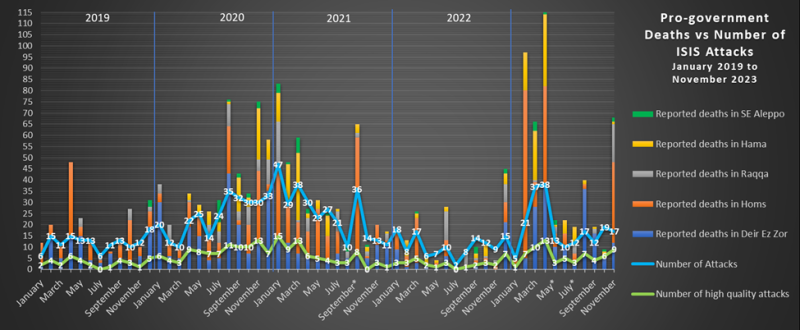
*Indicates attacks in Damascus City claimed by ISIS. Two additional IED attacks occurred in Homs City in June 2023 that went unclaimed but were suspected to be conducted by ISIS.
Confirmed ISIS attacks remained steady in Deir Ez Zor (4) and Aleppo (1), rose in Raqqa (3) and decreased in Homs (8) and Hama (1).
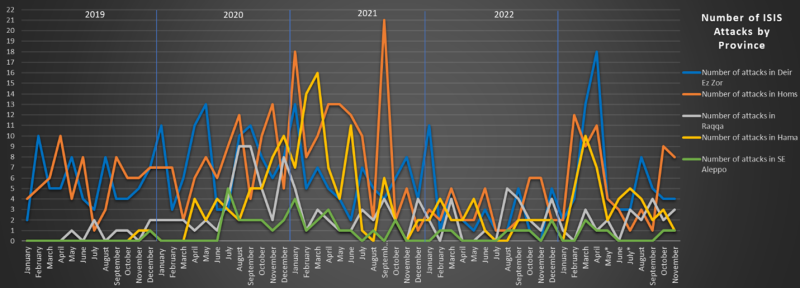
Deir Ez Zor and Raqqa
ISIS continues to conduct a low-level insurgency within the urban belt of Deir Ez Zor. On November 12, a Syrian soldier from the Russian-backed 5th Corps, 7th Brigade was killed somewhere in the Deir Ez Zor countryside. On November 22, two members of the 4th Division were gunned down in an ISIS ambush inside the town of Muhassan, between Deir Ez Zor and Mayadeen. The attack was reported locally and claimed by ISIS several days later. On November 24, a Syrian member of the Iran-backed Local Defense Forces was kidnapped and assassinated in Mayadeen, his body discovered several days later. Lastly, on November 28, a large group of local tribesmen affiliated with the regime’s Liwa al-Quds militia drove into a minefield outside the village of Shujairi, in Jabal Bishri. Eight were killed and 14 wounded, some seriously. It’s worth noting that Jabal Bishri is likely a key base of operations for ISIS cells across southern Raqqa and western Deir Ez Zor.
ISIS militants continue to operate aggressively across southern Raqqa as well. On November 8, ISIS militants ambushed a group of regime fighters near the key Resafa junction, killing nine soldiers. On November 13, ISIS attacked another regime position along the highway to the north, overrunning the outpost and looting food trucks, according to journalist Zain al-Abidin. Regime media reported three Republican Guard soldiers killed in the attack. On November 23, a regime military truck driving near the Waheb Oil Field in southwest Raqqa hit a mine or improvised explosive device (IED), leaving five soldiers dead according to Zain al-Abidin. Regime airstrikes were reported in southern Raqqa in response to the November 13 attack as well as on November 24.
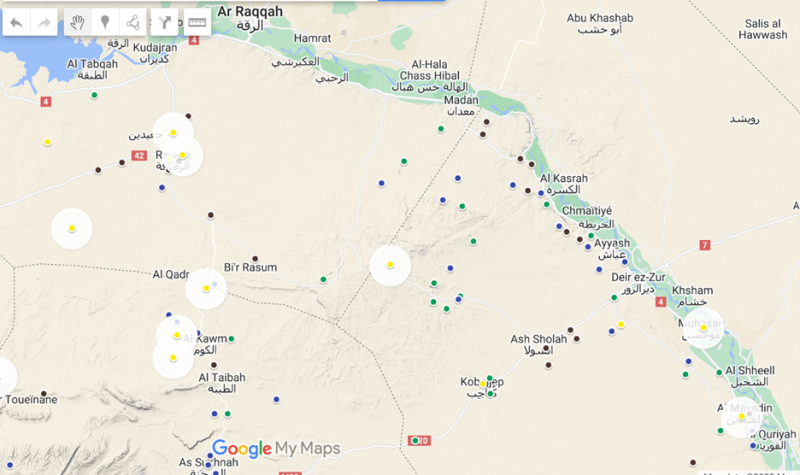
Map of locatable ISIS attacks in Dier Ez Zor and Raqqa (highlighted) in November 2023 alongside all other attacks in 2023. Not mapped is one attack that occurred somewhere in the Deir Ez Zor countryside.
Homs, Hama and Aleppo
ISIS activity in eastern Homs surged in October. This increase came after five months of generally muted activity in the region following the conclusion of the battles around al-Kawm. However, the withdrawal of Wagner Group forces from the Sukhnah and western Deir Ez Zor sectors seems to have spurred a new ISIS push to test the regime’s defenses around this key city. In October, large groups of ISIS militants launched coordinated, sustained assaults on regime positions south of Sukhnah, resulting in the group’s capture of the Doubayat Oil Field on October 18. Fighting in November was again heavy around the Doubayat front, but ISIS was also able to open a second front north of Sukhnah on the Kawm axis, utilizing cells in southern Raqqa and along the Hama-Homs border.
On November 5, ISIS captured a regime position several kilometers south of the Doubayat field. This marked the farthest expansion of ISIS control in and around the field, yet regime forces were already massing for a renewed offensive following multiple failed attempts in late October. Also on November 5, regime forces in the nearby Arak field successfully killed an ISIS cell in the area. Between November 5 and November 7, the Iranian-commanded Liwa Fatemiyoun lost at least 12 of its Afghan foreign fighters in clashes with ISIS south of the field (this has been coded as one incident due to a lack of details). By November 8, regime forces had begun pushing ISIS cells back towards the field thanks to the participation of a new group of local tribesmen. Fighting over the Doubayat Oil Field continued off and on for the next two weeks, with regime forces reportedly securing about half the field by November 21. However, there are not enough details available about the fighting for this author to code any additional attacks (see the caveat stated at the beginning of this report that more than 17 attacks likely occurred this month).
Meanwhile, ISIS opened a second front on November 8 when militants overran a regime base near the Rasm al-Kawm Gas Field, southwest of the strategic Kawm Oasis. Local media reported 24 militia fighters killed and nine wounded in the attack. ISIS officially claimed responsibility several days later, saying that its fighters burned down two barracks and looted trucks and weapons. On November 9, regime forces in the Bir Barbar hamlet along the Homs-Hama border came under heavy attack but managed to hold their positions. That same day, ISIS militants to the north of Kawm besieged regime forces in the Kadir hamlet and captured several positions along the Kawm-Resafa highway, cutting off the northern route to Kawm. During the fighting, ISIS reportedly managed to capture night vision equipment from security forces (ISIS has previously showcased its possession of thermal optics in the Badia in 2021). On November 12, ISIS militants launched an attack on regime positions west of Kawm. ISIS pressure around the Kawm axis eased late in the month, and regime forces were able to re-open the Kawm corridor on November 24.
There was only one attack reported in eastern Hama in November, a drop in activity following several serious ISIS attacks in October. On November 28, local pages reported a civilian was gunned down near Tel ‘Ada by two unknown men.
Suspected ISIS activity was reported in southern Aleppo for the second month in a row. On November 7, two soldiers were killed by a mine or IED in the Khanasir countryside.
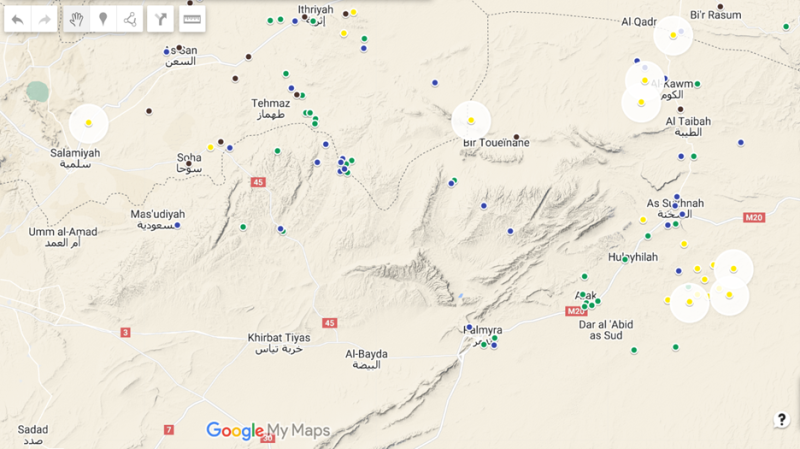
Map of locatable ISIS attacks in Homs and Hama (highlighted) in November 2023 alongside all other attacks in 2023.
Looking Ahead
ISIS will eventually lose control of the Doubayat Oil Field over the next weeks or months. Holding territory long-term (meaning functioning oil and gas fields or inhabited villages) is not part of ISIS’s strategy nor does it help the group achieve its near-term goals. The question then becomes whether or not ISIS will manage to withdraw from Doubayat without taking significant casualties. If so, October’s offensive and November’s defensive stand will have been a resounding success, allowing the group to seize materiel from regime positions, win an important moral victory and morale-boost for its fighters in the desert, and potentially leave the cells even better equipped for the next operation. It is important to remember that, based on visual and anecdotal evidence, ISIS is heavily focused on training its child recruits in central Syria right now. Each successful operation means real-time experience for these new militants and helps the group shore up its mid-term resiliency.
ISIS’s ability to maintain the fight in Doubayat while simultaneously launching heavy attacks along the Kawm and Resafa axes is an important marker for the group’s strength. It suggests that ISIS has multiple large groupings in the Badia right now that are well supplied and commanded, and confident enough in their strategic depth, to be able to engage in close and sustained combat with regime forces in a manner that has strategic impact (the regime had to divert forces from Kawm in October to assist with the Doubayat fighting). ISIS’s ability to partially exploit that in November should not be downplayed). Meanwhile, ISIS maintains a small but steady assassination campaign along the Euphrates River, the one part of the Badia that had always remained secure even during the height of ISIS’s offensives in 2020. The permeability of the Euphrates remains the key underlying factor of ISIS’s resiliency in central Syria. The Syrian regime and its local affiliates would do well to remember this fact as ISIS works to expand the smuggling networks that cross the river.
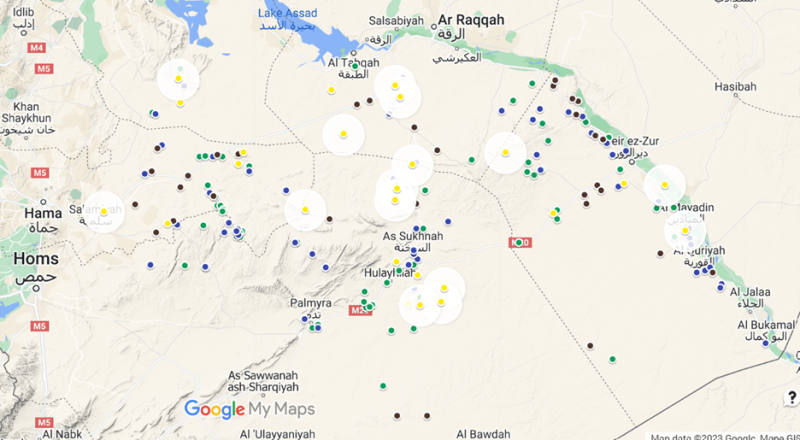
Map of locatable ISIS attacks (highlighted) in November 2023 alongside all other attacks in 2023 (green for Quarter 1, blue for Quarter 2, and black for Quarter 3). Not shown is one attack somewhere in Deir Ez Zor.
*High quality attacks are defined as attacks behind frontlines, those that result in seized positions, target regime officers, involve coordinated attacks on multiple positions, fake checkpoints, ambushes on military convoys, or attacks on checkpoints that kill at least three soldiers or lead to POWs.
 Eurasia Press & News
Eurasia Press & News

